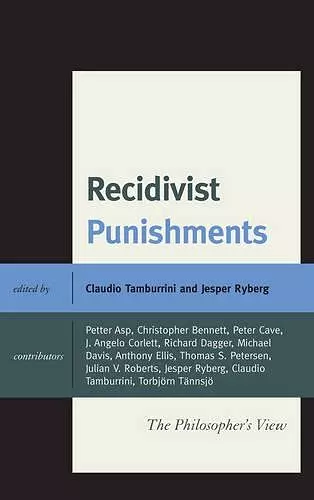Recidivist Punishments
The Philosopher's View
Claudio Tamburrini editor Jesper Ryberg editor
Format:Hardback
Publisher:Lexington Books
Published:8th Dec '11
Currently unavailable, and unfortunately no date known when it will be back

In most Western penal systems, recidivist criminals are punished more harshly than first offenders. The philosophical grounds for this response are however difficult to grasp. According to the retributive ideal, recidivists deserve harsher punishments, independently of the eventual effects of the recidivist premium on crime rates. Different notions of “desert” have been advanced in the literature to substantiate this claim. However, all of them have this problem in common: how to justify a harsher punishment of an offender on grounds of a past offence which s/he already paid for? According to a different approach, it is argued that by sentencing offenders to harsher punishments, particularly longer prison terms, we expect to deter them or other potential criminals from recidivating (individual and general deterrence) or at least we might keep them incapacitated by holding them in prison after the standard punishment has been served. During the last decade or so, a different approach has been advanced that underlies the communicative function of penal sanctions. Starting from the assumption that the public subscribes a higher degree of blameworthiness to recidivism, it is then argued that this general opinion should be reflected in the penal sanctions if we don’t want to risk discrediting the legal system. Finally, it could be argued that, although we don’t know for sure how many (if at all) future crimes can be prevented by recidivist premiums, it is not justified to take any risks in that regard, as we would then failing to protect future crime victims. The price for averting this uncertainty should therefore be paid by those who have broken the law in the past, according to these authors. But this can be made by submitting them to non-traditional forms of punishments. Much has been written about recidivist punishments, particularly within the area of criminology. There is however a notorious lack of (penal) philosophical reflection regarding this issue. In this book, all these different approaches to recidivist punishments are critically discussed with the ambition of filling that gap by presenting the philosophers’ view on this matter.
In Western societies, recidivist criminals often are punished more harshly than first offenders. The justification for this 'recidivist premium' poses a philosophical problem. According to jurist scholars and legal officers, when one violates the law more than once, society is justified in meting out a harsher penalty. The philosophical grounds seem to be at odds with this justification; one may justify the recidivist premium on retributive, deterrent, or communicative grounds. The problem with retribution is how to justify harsher punishment for a second crime when an individual has paid the price for the first crime. The problem with deterrence is familiar: how to prove the deterrent value of the recidivist premium or to predict which criminals are likely to recidivate. A recent communicative justification suggests that harsher punishments reflect a comment on the disregard for the criticism that the first punishment was meant to impart. This volume offers contributions by American and European philosophers, political theorists, and criminologists, selected to present both support and criticism for each philosophical justification of the recidivist premium. The arguments' sophistication and balance make this book a valuable contribution to the field. Summing Up: Recommended. * CHOICE *
ISBN: 9780739149966
Dimensions: 240mm x 162mm x 21mm
Weight: 508g
234 pages